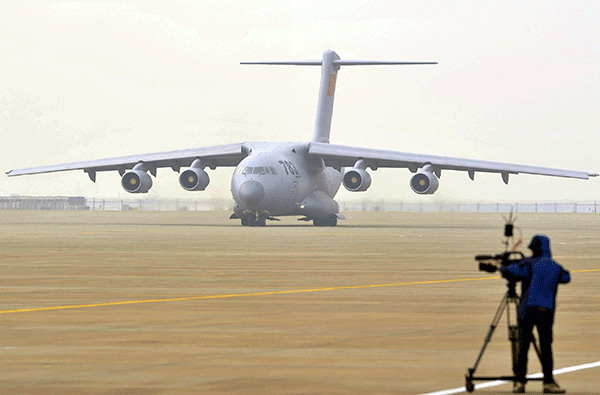
The Y-20 strategic transport aircraft, China's first domestically developed heavy-lift transport plane, is shown at the 10th China International Aviation and Aerospace Exhibition in Zhuhai, Guangdong province, in November last year.(Photo/Xinhua)
Editor's note: The Central Military Commission Reform Work Meeting was held from Nov 24 to 26 to map out a plan for deepening reform in the military. Zhang Junshe, a military expert, talks with China Daily's Zhang Zhouxiang on how the reform move should be interpreted. Excerpts:
Question: Why has the CMC launched military reform? What are its main objectives?
Answer: Through the military reform, the CMC aims to strengthen the military's capability so that it can meet the demands of the changing global situations. Wars in the future will be high-tech, with information technology playing the key role, which will require the commanders to respond to situations and make decisions quickly. Some of the reform measures serve this purpose. For instance, the reform is aimed at making breakthroughs in military administration and joint operational command, and optimizing military structure.
Q: The CMC will do away with some of its redundant administrative departments and non-fighting units. Is it aimed at making the military more efficient?
A: Exactly. Redundancy has always been a problem for the military. The reform this time shows the top leadership is determined to solve it. By being alert and agile, the leadership can also provide more positions and personnel for actual combat troops.
More importantly, the CMC has set a good example for lower-level administrative departments, which would encourage them to cut their redundancy, too.
Q: A new PLA Army leading organization will be established. What difference will it make?
A: It will make a huge difference. The ground forces of the People's Liberation Army have long been without a unified leading organization, and four departments are in charge of its general staff, politics, logistical supply and equipment. That reduces efficiency, because the Central Commission organs are also in charge of the whole PLA along with its ground forces. At the same time, insufficient coordination also lowers the development potential of the PLA Army.
With a new and unified leading organization, the PLA Army will strengthen coordination and develop in a more concentrated way. The Central Commission organs can also invest more energy in the construction of the whole military, which is their job.
Q: Three years have passed since the nationwide anti-corruption campaign was launched. Why is there a new disciplinary commission for the PLA now?
A: It is a major move to combat corruption in the military, which showed the Party and the military's determination to do so. The military disciplinary commission will be more independent and authoritative to fight against corruption.
Moreover, disciplinary inspectors will be sent to CMC departments and zone commands. The reform will also advance the disciplinary commission's dual leading system, under which the disciplinary commission is responsible to both the same-level Party committee and the higher-level disciplinary commission.
In fact, the reform will grant relatively greater independence to other departments, such as auditing agencies, which in turn will help regulate power within the military. A new military politics and law committee will be set up with military justice system being adjusted, which will keep power in check.
Q: Why does the plan promote integration of military and civil industries' development?
A: This strategy dates back to the 1980s, and now its importance has been re-emphasized. But the reality is totally different. During the 1980s, military industries owned more advanced technologies than their civil counterparts in most fields, so a strategy was introduced to commercialize some military technologies for civil use.
Today, however, despite taking the lead in many research programs, private enterprises still do not have enough channels to work with military industries. Hopefully, through reform they will get more opportunities.
Q: Another notable point of the reform is to end the practice of certain military agencies providing paid services for society. It reminds us of 1998, when the CMC imposed restrictions on the PLA to run businesses. Is there any difference?
A: In the 1980s, military units were allowed to run businesses, but the practice was stopped in 1998 because it bred corruption. In order to propel reform gradually, only a very few number of military agencies were allowed to continue providing paid services for non-military companies or individuals. Now the leadership is continuing the reform with a total ban on the practice.


















































